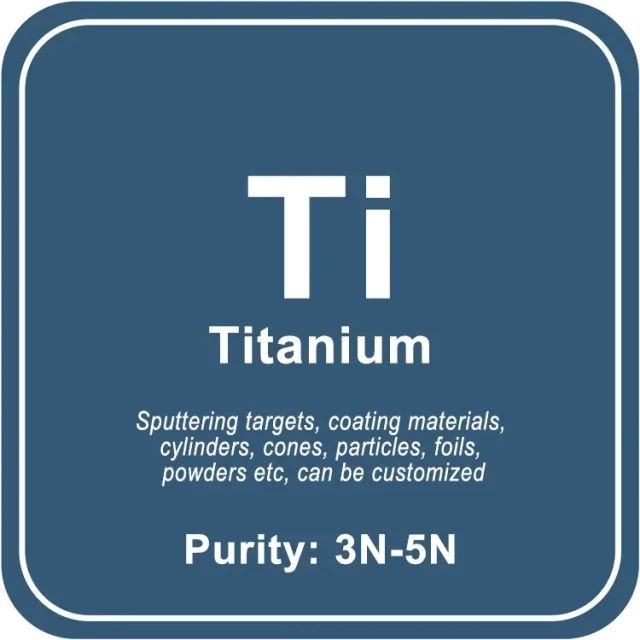
Lab Materials
High Purity Titanium (Ti) Sputtering Target / Powder / Wire / Block / Granule
Item Number : LM-TI
Price varies based on specs and customizations
- Chemical Formula
- Ti
- Purity
- 3N-5N
- Shape
- discs / wire / block / powder / plates / column targets / step target / custom-made

Shipping:
Contact us to get shipping details Enjoy On-time Dispatch Guarantee.
At reasonable prices, we offer Titanium (Ti) materials for laboratory use. Our expertise lies in producing and tailoring Titanium (Ti) materials of different purities, shapes, and sizes to suit your unique requirements.
We provide a wide range of specifications and sizes for various Titanium (Ti) products, such as sputtering targets (circular, square, tubular, irregular), coating materials, cylinders, cones, particles, foils, powders, 3D printing powders, nanometer powders, wire rods, ingots, and blocks, among others.
Details








About Titanium (Ti)
Titanium is a versatile metal that possesses unique properties, including high strength, low density, and exceptional resistance to corrosion. Due to these attributes, it has found widespread use in various applications, particularly in the aerospace and military industries.
Titanium dioxide, one of the most common compounds of titanium, is used extensively to produce a white pigment for various applications. Additionally, titanium forms the basis of numerous commercially essential compound groups, including titanates used in electronic and dielectric formulations, as well as in crystal growth for ruby and sapphire lasers.
Titanium is available in several forms, including elemental or metallic forms such as pellets, rods, wires, and granules that are used for evaporation source materials. Furthermore, titanium nanoparticles and nanopowders provide ultra-high surface area for specialized applications.
Titanium oxides are also available in powder and dense pellet forms for uses such as optical coatings and thin film applications. However, they tend to be insoluble. Titanium fluorides, another insoluble form of titanium, are used in applications where oxygen is undesirable, such as metallurgy, chemical and physical vapor deposition, and some optical coatings.
Lastly, titanium is available in soluble forms, including chlorides, nitrates, and acetates, which can be manufactured as solutions at specified stoichiometries. Overall, titanium and its various forms and compounds offer a wide range of possibilities for material scientists and other professionals working in diverse fields.
Ingredient Quality Control
- Raw material composition analysis
- Through the use of equipment such as ICP and GDMS, the content of metal impurities is detected and analyzed to ensure that it meets the purity standard;
Non-metallic impurities are detected by equipment such as carbon and sulfur analyzers, nitrogen and oxygen analyzers. - Metallographic flaw detection analysis
- The target material is inspected using flaw detection equipment to ensure that there are no defects or shrinkage holes inside the product;
Through metallographic testing, the internal grain structure of the target material is analyzed to ensure that the grains are fine and dense. - Appearance and dimension inspection
- Product dimensions are measured using micrometers and precision calipers to ensure compliance with drawings;
The surface finish and cleanliness of the product are measured using a surface cleanliness meter.
Conventional Sputtering Target Sizes
- Preparation process
- hot isostatic pressing, vacuum melting, etc.
- Sputtering target shape
- plane sputtering target, multi-arc sputtering target, step sputtering target, special-shaped sputtering target
- Round sputtering target size
- Diameter: 25.4mm / 50mm / 50.8mm / 60mm / 76.2mm / 80mm / 100mm / 101.6mm / 152.4mm
Thickness: 3mm / 4mm / 5mm / 6mm / 6.35mm
Size can be customized. - Square sputtering target size
- 50×50×3mm / 100×100×4mm / 300×300×5mm, size can be customized
Available Metal Forms
Metal Forms Details
We manufacture almost all the metals listed on the periodic table in a wide range of forms and purities, as well as standard sizes and dimensions. We can also produce custom-made products to meet specific customer requirements, such as size, shape, surface area, composition, and more. The following list provides a sample of the forms we offer, but it is not exhaustive. If you need laboratory consumables, please contact us directly to request a quote.
- Flat/Planar Forms: Board, Film, Foil, Microfoil, Microleaf, Paper, Plate, Ribbon, Sheet, Strip, Tape, Wafer
- Preformed Shapes: Anodes, Balls, Bands, Bars, Boats, Bolts, Briquettes, Cathodes, Circles, Coils, Crucibles, Crystals, Cubes, Cups, Cylinders, Discs, Electrodes, Fibers, Filaments, Flanges, Grids, Lenses, Mandrels, Nuts, Parts, Prisms, Pucks, Rings, Rods, Shapes, Shields, Sleeves, Springs, Squares, Sputtering Targets, Sticks, Tubes, Washers, Windows, Wires
- Microsizes: Beads, Bits, Capsules, Chips, Coins, Dust, Flakes, Grains, Granules, Micropowder, Needles, Particles, Pebbles, Pellets, Pins, Pills, Powder, Shavings, Shot, Slugs, Spheres, Tablets
- Macrosizes: Billets, Chunks, Cuttings, Fragments, Ingots, Lumps, Nuggets, Pieces, Punchings, Rocks, Scraps, Segments, Turnings
- Porous and Semi-Porous: Fabric, Foam, Gauze, Honeycomb, Mesh, Sponge, Wool
- Nanoscale: Nanoparticles, Nanopowders, Nanofoils, Nanotubes, Nanorods, Nanoprisms
- Others: Concentrate, Ink, Paste, Precipitate, Residue, Samples, Specimens
KinTek specializes in the manufacturing of high-purity and ultra-high-purity materials with a purity range of 99.999% (5N), 99.9999% (6N), 99.99995% (6N5), and in some cases, up to 99.99999% (7N). Our materials are available in specific grades, including UP/UHP, semiconductor, electronic, deposition, fiber optic, and MBE grades. Our high-purity metals, oxides, and compounds are specifically crafted to meet the rigorous demands of high-technology applications and are ideal for use as dopants and precursor materials for thin film deposition, crystal growth of semiconductors, and synthesis of nanomaterials. These materials find use in advanced microelectronics, solar cells, fuel cells, optical materials, and other cutting-edge applications.
Packaging
We use vacuum packaging for our high-purity materials, and each material has specific packaging tailored to its unique characteristics. For instance, our Hf sputter target is externally tagged and labeled to facilitate efficient identification and quality control. We take great care to prevent any damage that could occur during storage or transportation.
FAQ
What Is Sputtering Target?
What Are High Purity Materials?
What Is Vacuum Arc Melting Process?
What Are High Purity Metals?
How Are Sputtering Targets Made?
What Is VAR Vacuum Arc Remelting (VAR)Furnace?
What Are High Purity Metals Used For?
What Is Sputtering Target Used For?
How Does Vacuum Arc Melting Furnace Work?
What Are The Benefits Of Using High-purity Metals?
What Are Sputtering Targets For Electronics?
What Are The Applications Of Vacuum Arc Melting Furnaces?
Which Industries Commonly Use High-purity Metals?
What Is The Lifetime Of A Sputtering Target?
What Are The Advantages Of Using Vacuum Arc Melting Furnaces?
What Safety Precautions Should Be Followed When Using A Vacuum Arc Melting Furnace?
4.9
out of
5
KINTEK's Titanium (Ti) products are top-notch. They've consistently delivered high-quality materials that meet our stringent requirements.
4.8
out of
5
The Titanium (Ti) sputtering targets we received from KINTEK were of exceptional quality. The purity and grain size were excellent, leading to superb thin film properties.
4.7
out of
5
KINTEK's Titanium (Ti) powders are highly pure and consistent. They've enabled us to produce high-performance components with remarkable strength and corrosion resistance.
4.9
out of
5
We've been using KINTEK's Titanium (Ti) wires for years. They're incredibly durable and have significantly reduced our downtime due to breakage.
4.8
out of
5
KINTEK's Titanium (Ti) blocks are perfect for our high-temperature applications. They provide exceptional thermal conductivity and withstand extreme conditions.
4.7
out of
5
The Titanium (Ti) granules from KINTEK are consistently uniform in size and shape. They've improved the efficiency of our manufacturing process significantly.
4.9
out of
5
KINTEK's Titanium (Ti) sputtering targets have enabled us to produce thin films with superior properties. The purity and uniformity of their materials are truly impressive.
4.8
out of
5
We've been using KINTEK's Titanium (Ti) powders for our 3D printing applications. They provide excellent flowability and produce high-quality parts with intricate details.
4.7
out of
5
The Titanium (Ti) nanometer powders from KINTEK have been instrumental in our research on advanced materials. Their ultra-high surface area has enabled us to achieve remarkable results.
4.9
out of
5
KINTEK's Titanium (Ti) wire rods are incredibly strong and flexible. They've been a game-changer for our welding operations, reducing downtime and improving productivity.
4.8
out of
5
We've been using KINTEK's Titanium (Ti) ingots for our casting processes. They're highly pure and provide excellent yields of high-quality castings.
4.7
out of
5
KINTEK's Titanium (Ti) blocks are perfect for our high-pressure applications. They exhibit exceptional strength and durability, ensuring reliable performance under extreme conditions.
4.9
out of
5
KINTEK's Titanium (Ti) sputtering targets have been a revelation for our thin film deposition processes. The purity and uniformity of their materials have resulted in outstanding film properties.
4.8
out of
5
We've been using KINTEK's Titanium (Ti) powders for our additive manufacturing applications. They're highly consistent and produce parts with exceptional mechanical properties.
4.7
out of
5
The Titanium (Ti) nanometer powders from KINTEK have been a valuable addition to our research on energy storage materials. Their ultra-high surface area has facilitated the development of high-performance electrodes.
4.9
out of
5
KINTEK's Titanium (Ti) wire rods are incredibly versatile. We've used them for various applications, including welding, brazing, and electrical connections, with excellent results.
4.8
out of
5
We've been using KINTEK's Titanium (Ti) ingots for our forging operations. They're highly pure and produce forged components with exceptional strength and toughness.
4.7
out of
5
KINTEK's Titanium (Ti) blocks are perfect for our machining applications. They're easy to work with and produce parts with excellent dimensional accuracy and surface finish.
REQUEST A QUOTE
Our professional team will reply to you within one business day. Please feel free to contact us!
Related Products
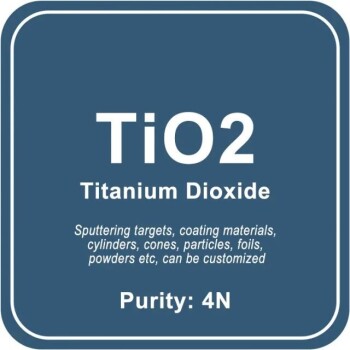
High Purity Titanium Dioxide (TiO2) Sputtering Target / Powder / Wire / Block / Granule
Looking for high-quality Titanium Dioxide materials? Our tailored products suit any lab's unique requirements. Browse our range of shapes, sizes, and purities today.
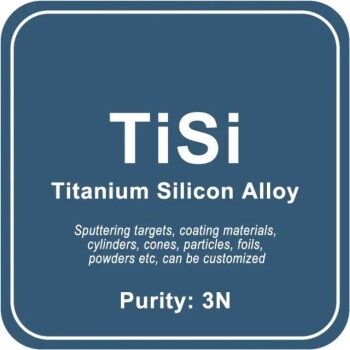
Titanium Silicon Alloy (TiSi) Sputtering Target / Powder / Wire / Block / Granule
Discover our affordable Titanium Silicon Alloy (TiSi) materials for laboratory use. Our custom production offers various purities, shapes, and sizes for sputtering targets, coatings, powders, and more. Find the perfect match for your unique needs.
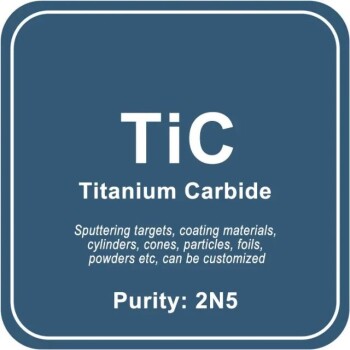
Titanium Carbide (TiC) Sputtering Target / Powder / Wire / Block / Granule
Get high-quality Titanium Carbide (TiC) materials for your lab at affordable prices. We offer a wide range of shapes and sizes, including sputtering targets, powders, and more. Tailored to your specific needs.
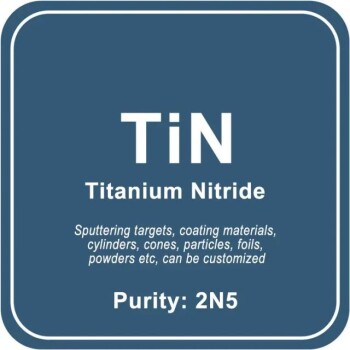
Titanium Nitride (TiN) Sputtering Target / Powder / Wire / Block / Granule
Looking for affordable Titanium Nitride (TiN) materials for your lab? Our expertise lies in producing tailored materials of different shapes and sizes to meet your unique needs. We offer a wide range of specifications and sizes for sputtering targets, coatings, and more.
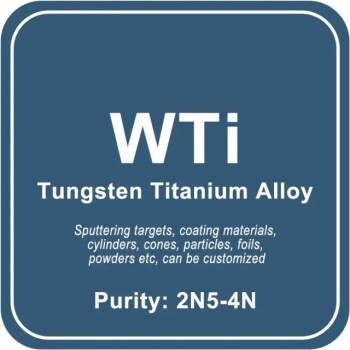
Tungsten Titanium Alloy (WTi) Sputtering Target / Powder / Wire / Block / Granule
Discover our Tungsten Titanium Alloy (WTi) materials for laboratory use at affordable prices. Our expertise allows us to produce custom materials of different purities, shapes, and sizes. Choose from a wide range of sputtering targets, powders, and more.

High-purity titanium foil / titanium sheet
Titanium is chemically stable, with a density of 4.51g/cm3, which is higher than aluminum and lower than steel, copper, and nickel, but its specific strength ranks first among metals.
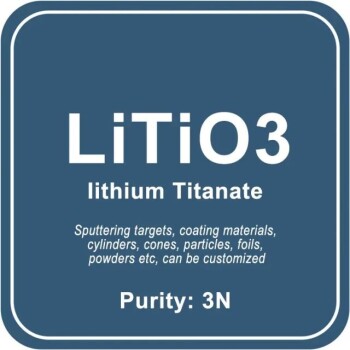
Iithium titanate (LiTiO3) Sputtering Target / Powder / Wire / Block / Granule
Get high-quality Iithium Titanate (LiTiO3) materials for your laboratory at reasonable prices. Our tailored solutions cater to different purities, shapes, and sizes, including sputtering targets, coating materials, powders, and more. Order now!
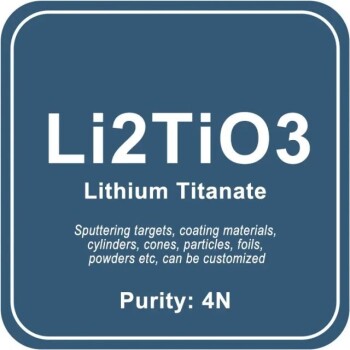
Lithium Titanate (Li2TiO3) Sputtering Target / Powder / Wire / Block / Granule
Get high-quality Lithium Titanate materials for your lab needs at affordable prices. We offer tailored solutions with different shapes, sizes, and purities. Find sputtering targets, powders, and more in various specifications.
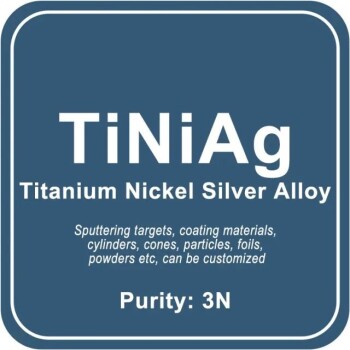
Titanium Nickel Silver Alloy (TiNiAg) Sputtering Target / Powder / Wire / Block / Granule
Looking for customizable TiNiAg materials? We offer a wide range of sizes and purities at competitive prices, including sputtering targets, coating materials, powders, and more. Contact us today!
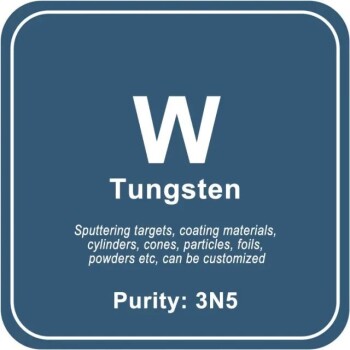
High Purity Tungsten (W) Sputtering Target / Powder / Wire / Block / Granule
Find high-quality Tungsten (W) materials for your laboratory needs at affordable prices. We offer customized purities, shapes, and sizes of sputtering targets, coating materials, powders, and more.
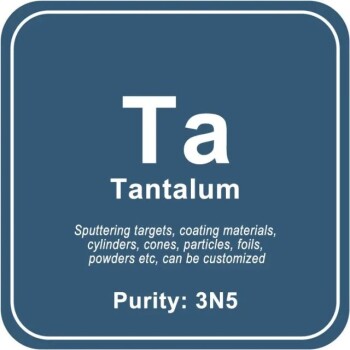
High Purity Tantalum (Ta) Sputtering Target / Powder / Wire / Block / Granule
Discover our high-quality Tantalum (Ta) materials for laboratory use at affordable prices. We tailor to your specific requirements with various shapes, sizes, and purities. Explore our range of sputtering targets, coating materials, powders, and more.
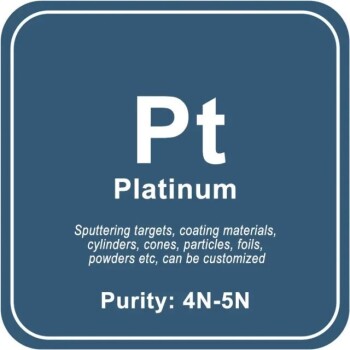
High Purity Platinum (Pt) Sputtering Target / Powder / Wire / Block / Granule
High purity Platinum (Pt) sputtering targets, powders, wires, blocks, and granules at affordable prices. Tailored to your specific needs with diverse sizes and shapes available for various applications.
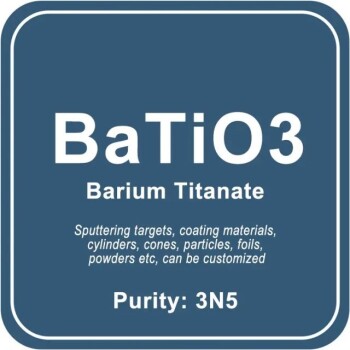
Barium Titanate (BaTiO3) Sputtering Target / Powder / Wire / Block / Granule
Discover our range of customized Barium Titanate (BaTiO3) materials for laboratory use. We provide a diverse selection of specifications and sizes for sputtering targets, coating materials, powders, and more. Contact us today for reasonable prices and tailored solutions.
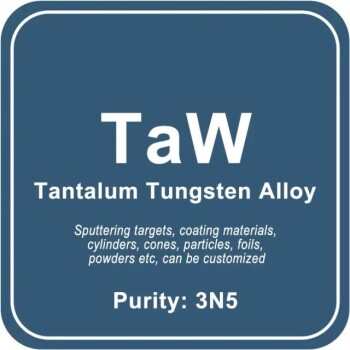
Tantalum Tungsten Alloy (TaW) Sputtering Target / Powder / Wire / Block / Granule
Looking for high-quality Tantalum Tungsten Alloy (TaW) materials? We offer a wide range of customizable options at competitive prices for laboratory use, including sputtering targets, coatings, powders, and more.
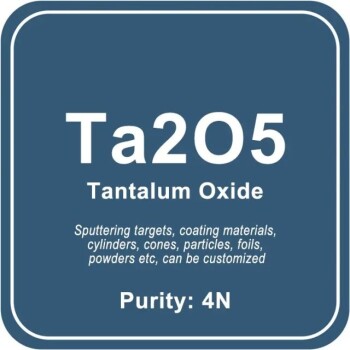
High Purity Tantalum Oxide (Ta2O5) Sputtering Target / Powder / Wire / Block / Granule
Find high-quality Tantalum Oxide (Ta2O5) materials for your laboratory needs at affordable prices. Our experts can tailor materials of various purities, shapes, and sizes to meet your specific requirements. Check out our range of sputtering targets, coating materials, powders, and more.
Related Articles

Hot Isostatic Pressing Achieving Optimal Microstructure Uniformity
Hot Isostatic Pressing(HIP ) is a technology used to densify materials at high temperatures and pressures. The process involves placing a material in a sealed container, which is then pressurized with an inert gas and heated to a high temperature.

Cold Isostatic Pressing: An Overview and its Industrial Applications
Cold isostatic pressing (CIP) is a method of processing materials by using liquid pressure to compact powder. It is similar to metal mold processing and is based on Pascal's law.

PVD Sputtering Targets and Hot Isostatic Pressing: Part 1
Explores the use of hot isostatic pressing in producing high-quality sputtering targets and the applications of PVD sputtering technology.

Advanced Surface Treatment: Titanium CVD Coating
Explores the benefits and applications of CVD coatings on titanium alloys, focusing on wear resistance, corrosion resistance, and thermal stability.

PVD Sputtering Targets and Hot Isostatic Pressing: Part 2
This article discusses the manufacturing and optimization of PVD sputtering targets, focusing on techniques like hot isostatic pressing and high pressure heat treatment.

Understanding and Preventing Magnetron Sputtering Target Poisoning
Discusses the phenomenon of target poisoning in magnetron sputtering, its causes, effects, and preventive measures.

Vacuum Induction Melting: Principles, Processes, and Applications
An in-depth look at the vacuum induction melting process, its characteristics, applications, and equipment structure.

Understanding Sputtering Deposition Technology
An in-depth look at sputtering deposition technology, its mechanisms, types, and applications.

Challenges in TiN Film Deposition Using AC Power and Solutions
Discusses the difficulties of TiN film growth under AC power and proposes solutions like DC sputtering and pulsed DC.